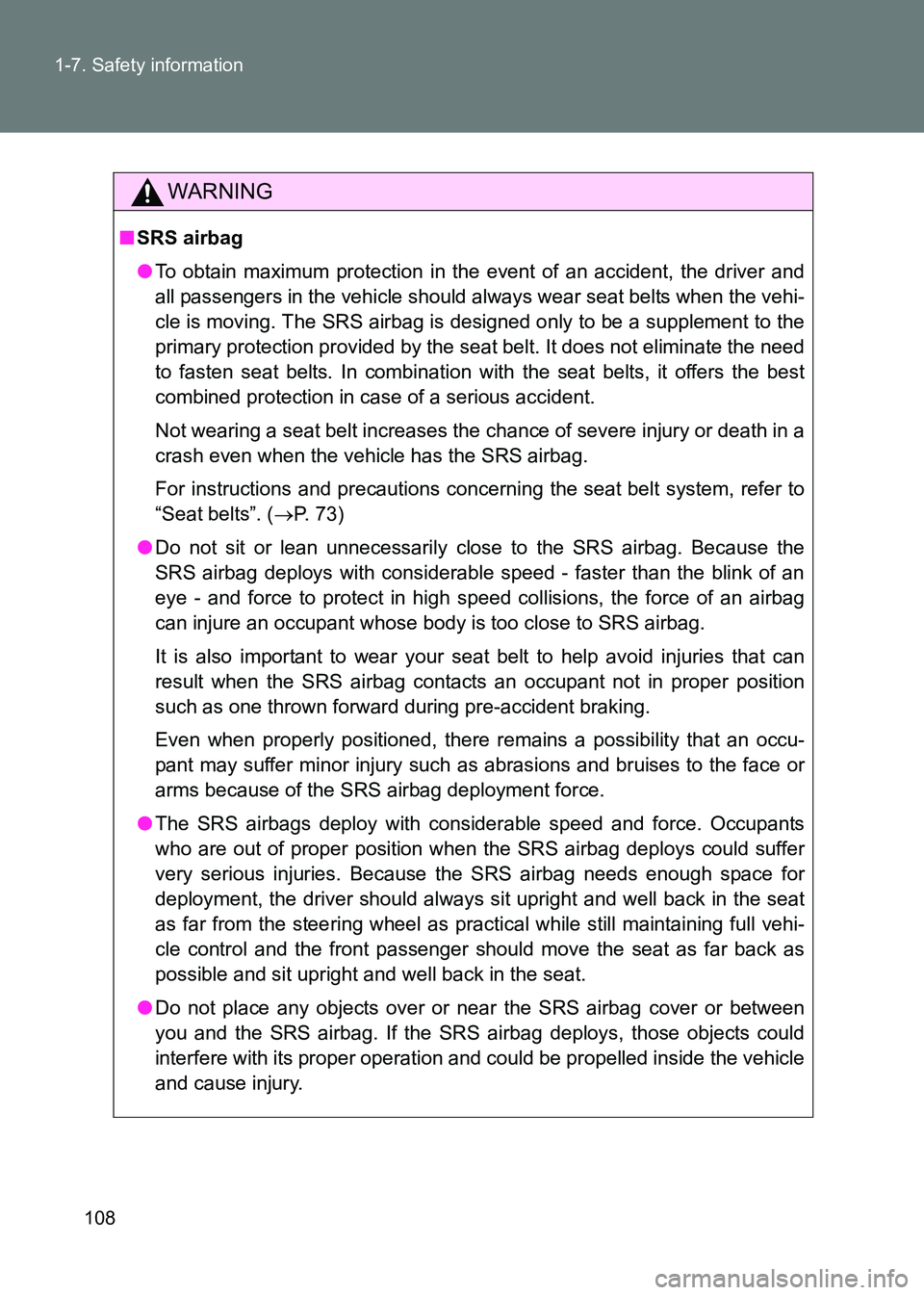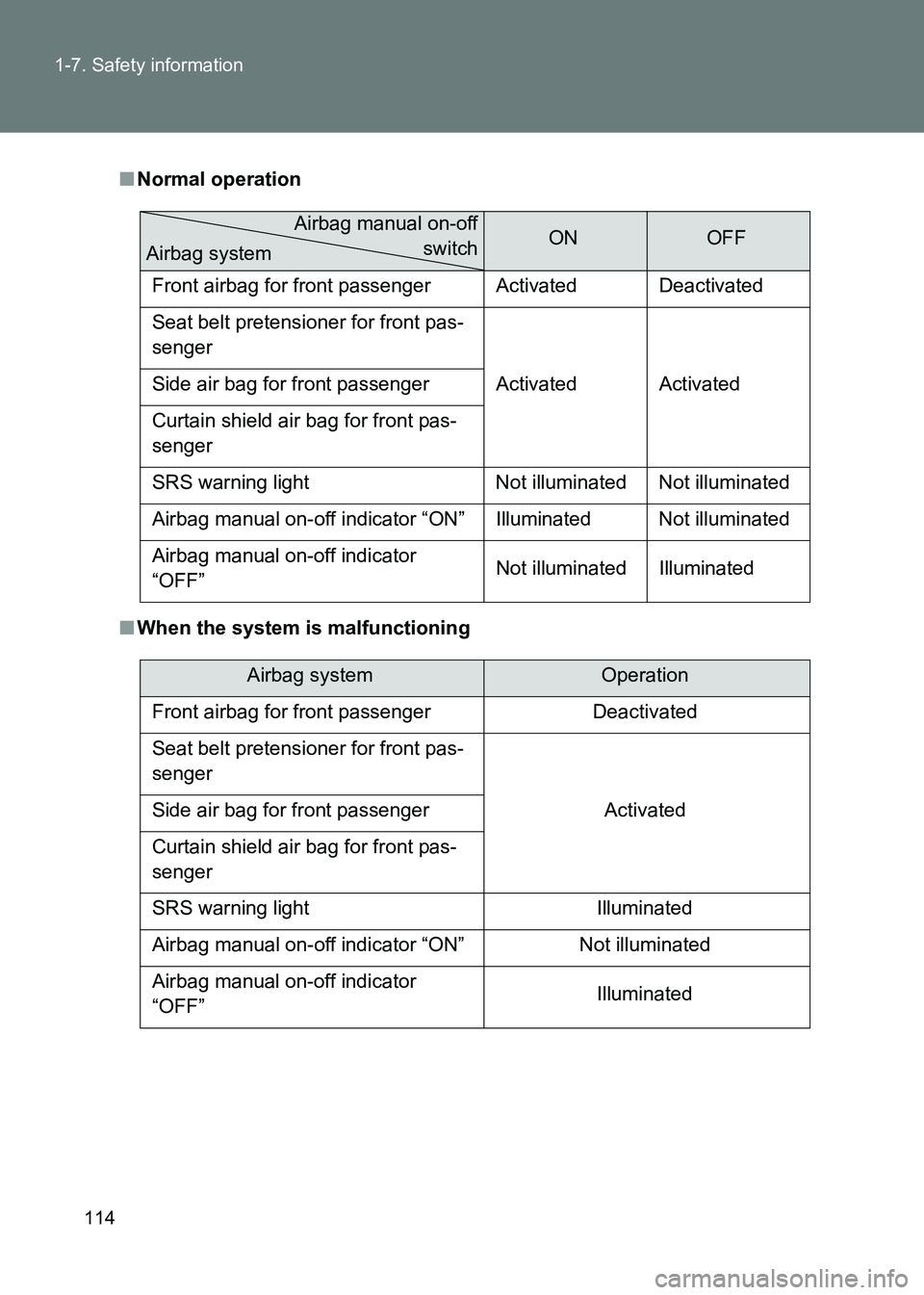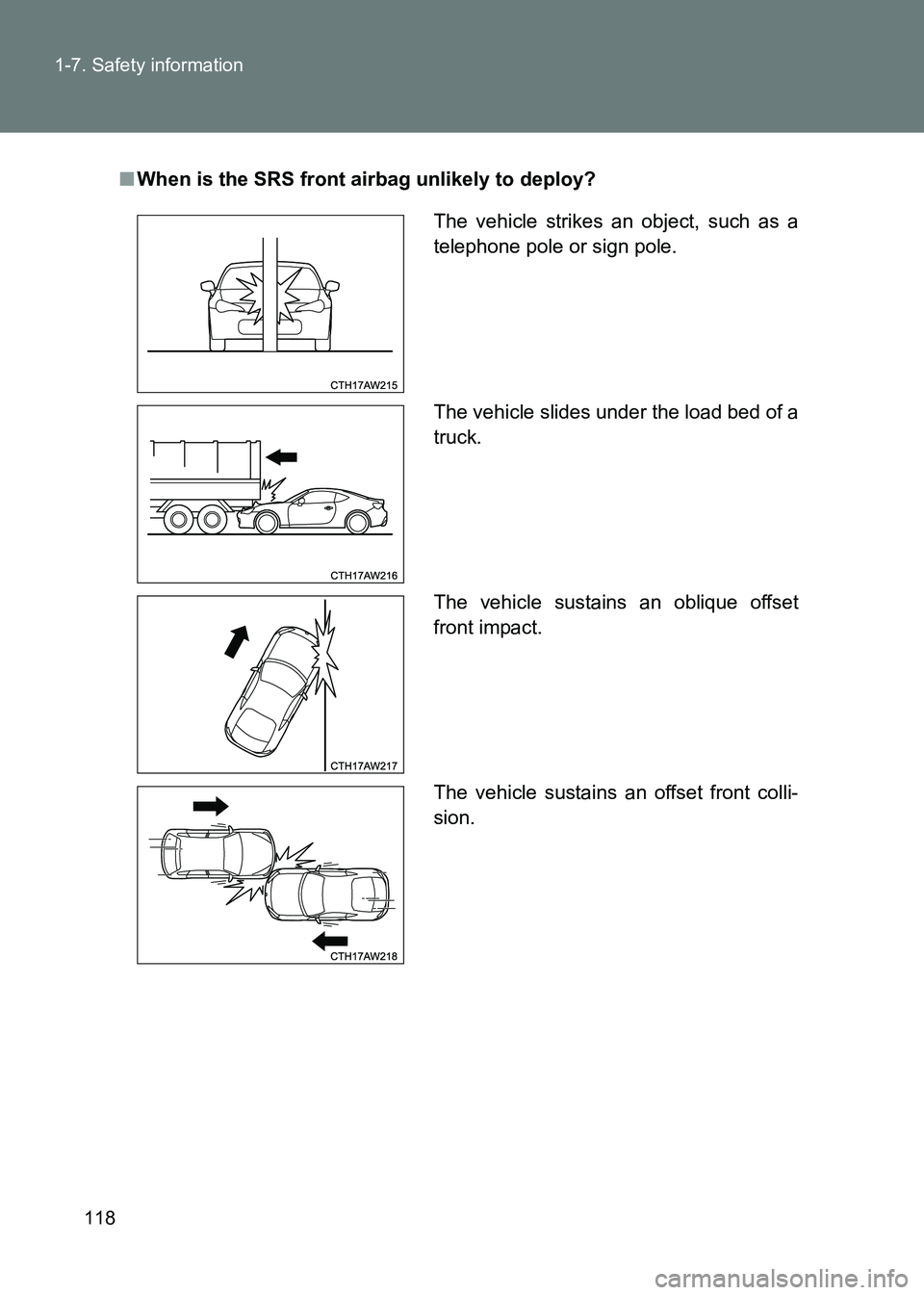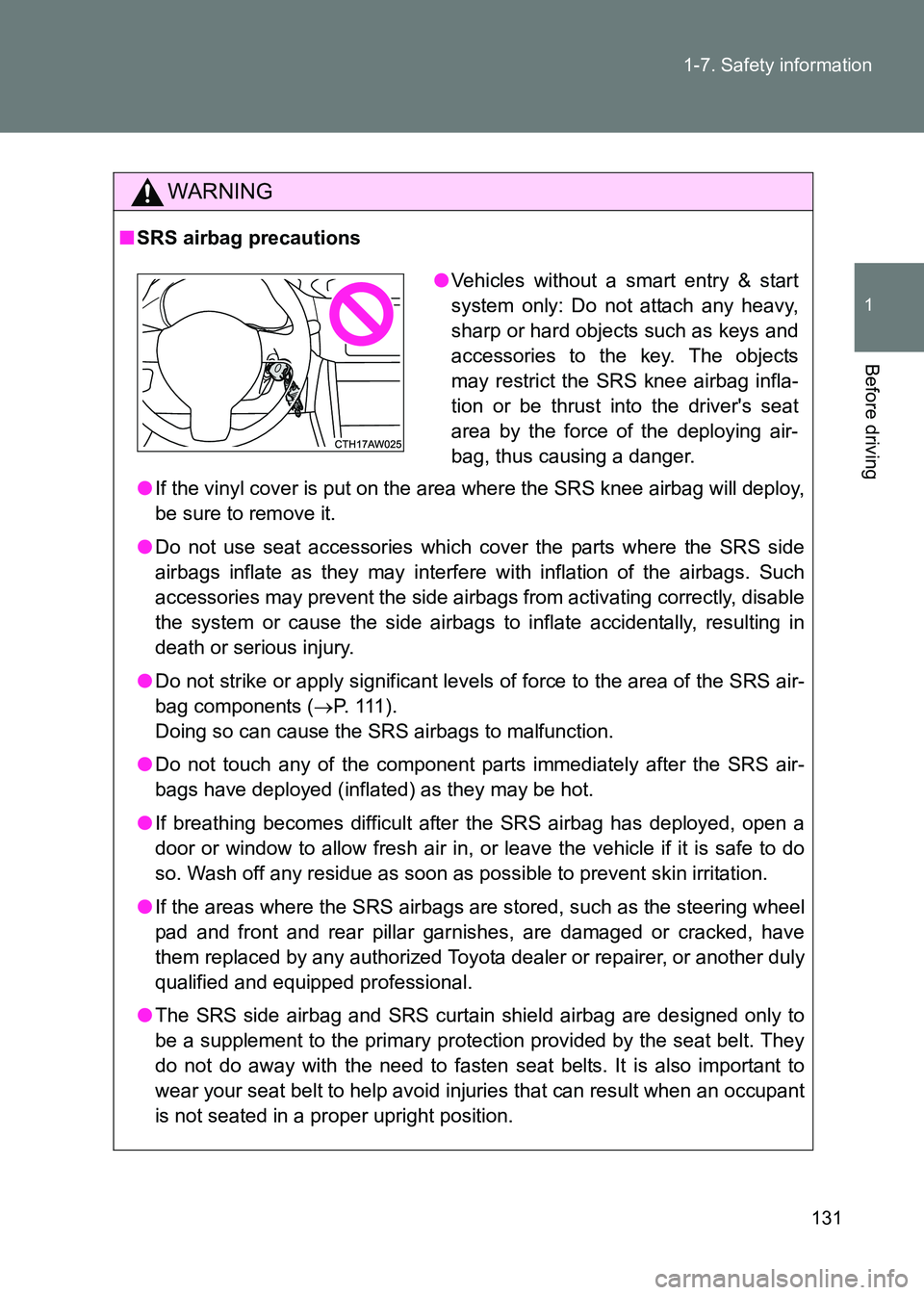2017 TOYOTA GT86 airbag off
[x] Cancel search: airbag offPage 2 of 505

TABLE OF CONTENTSIndex
86_EE (OM18071E)
2
1-1. Key informationKeys ...................................... 32
1-2. Opening, closing and locking the doors and
trunk
Smart entry & start system ........................ 35
Wireless remote control ........ 52
Doors .................................... 57
Trunk..................................... 60
1-3. Adjustable components (seats, mirrors, steering
wheel)
Front seats ............................ 66
Rear seats ............................ 69
Head restraints ..................... 71
Seat belts .............................. 73
Steering wheel ...................... 80
Anti-glare inside rear view mirror .................................. 81
Outside rear view mirrors...... 82
1-4. Opening and closing the windows
Power windows ..................... 85
1-5. Refueling Opening the fuel tank cap ..... 89 1-6. Theft deterrent system
Engine immobilizer system................................ 93
Double locking system ....... 102
1-7. Safety information Correct driving posture ....... 104
SRS airbag (Supplemental Restraint
System airbag) ................. 106
Child restraint systems ....... 136
Installing child restraints ..... 145
Airbag manual on-off system.............................. 155
2-1. Driving procedures Driving the vehicle .............. 160
Engine (ignition) switch (vehicles with a
smart entry &
start system) .................... 174
Engine (ignition) switch (vehicles without a
smart entry &
start system) .................... 183
Automatic transmission ...... 186
Manual Transmission ......... 193
Turn signal lever................. 197
Parking brake ..................... 198
Horn ................................... 199
1Before driving
2When driving
Page 31 of 505

1Before driving
31
86_EE (OM18071E)
1-1. Key informationKeys.................................... 32
1-2. Opening, closing and locking the doors and
trunk
Smart entry & start system ...................... 35
Wireless remote control ...... 52
Doors .................................. 57
Trunk .................................. 60
1-3. Adjustable components (seats, mirrors, steering
wheel)
Front seats.......................... 66
Rear seats .......................... 69
Head restraints ................... 71
Seat belts............................ 73
Steering wheel .................... 80
Anti-glare inside rear view mirror ................................ 81
Outside rear view mirrors .............................. 82 1-4. Opening and closing the
windows
Power windows ................... 85
1-5. Refueling Opening the fuel tank cap .................................... 89
1-6. Theft deterrent system Engine immobilizer system .............................. 93
Double locking system ...... 102
1-7. Safety information Correct driving posture ..... 104
SRS airbag (Supplemental Restraint
System airbag) ............... 106
Child restraint systems ..... 136
Installing child restraints ......................... 145
Airbag manual on-off system ............................ 155
Page 108 of 505

108
1-7. Safety information
86_EE (OM18071E)
WARNING
■
SRS airbag
●To obtain maximum protection in the event of an accident, the driver and
all passengers in the vehicle should always wear seat belts when the vehi-
cle is moving. The SRS airbag is designed only to be a supplement to the
primary protection provided by the seat belt. It does not eliminate the need
to fasten seat belts. In combination with the seat belts, it offers the best
combined protection in case of a serious accident.
Not wearing a seat belt increases the chance of severe injury or death in a
crash even when the vehicle has the SRS airbag.
For instructions and precautions conc erning the seat belt system, refer to
“Seat belts”. ( →P. 73)
● Do not sit or lean unnecessarily close to the SRS airbag. Because the
SRS airbag deploys with considerable speed - faster than the blink of an
eye - and force to protect in high speed collisions, the force of an airbag
can injure an occupant whose body is too close to SRS airbag.
It is also important to wear your seat belt to help avoid injuries that can
result when the SRS airbag contacts an occupant not in proper position
such as one thrown forward during pre-accident braking.
Even when properly positioned, there remains a possibility that an occu-
pant may suffer minor injury such as abrasions and bruises to the face or
arms because of the SRS airbag deployment force.
● The SRS airbags deploy with considerable speed and force. Occupants
who are out of proper position when the SRS airbag deploys could suffer
very serious injuries. Because the SRS airbag needs enough space for
deployment, the driver should always sit upright and well back in the seat
as far from the steering wheel as practical while still maintaining full vehi-
cle control and the front passenger should move the seat as far back as
possible and sit upright and well back in the seat.
● Do not place any objects over or near the SRS airbag cover or between
you and the SRS airbag. If the SRS airbag deploys, those objects could
interfere with its proper operation and could be propelled inside the vehicle
and cause injury.
Page 111 of 505

111
1-7. Safety information
1
Before driving
86_EE (OM18071E)
SRS airbag system components
Front sub sensor (right-hand
side)
Front airbag module (driver's
side)
Front passenger’s front air-
bag ON and OFF indicator
(center of instrument panel)
Front airbag module (front
passenger’s side)
Front passenger’s front air-
bag cut off switch (passen-
ger’s side of instrument
panel)
Door impact sensor (right-
hand side)
Curtain shield airbag mod-
ule (right-hand side)
Airbag wiring
Side airbag module (front
passenger’s side) Side airbag sensor (center
pillar right-hand side)
Curtain shield airbag sensor
(rear wheel house right-hand
side)
Seat belt pretensioner (front
passenger’s side)
Satellite safing sensor
(under the center of the rear
seats)
Curtain shield airbag sensor
(rear wheel house left-hand
side)
Side airbag module (driver’s
side)
Seat belt pretensioner
(driver’s side)
Side airbag sensor (center
pillar left-hand side)
Page 113 of 505

113
1-7. Safety information
1
Before driving
86_EE (OM18071E)
SRS front airbag
The driver’s SRS front ai
rbag is stowed in the cent er portion of the steering
wheel. The driver’s knee airbag is stowed under the steering column. The
passenger’s SRS front airbag is stowed near the top of the dashboard under
an “SRS AIRBAG” mark.
In a moderate to severe front collision, the following components deploy.
● SRS front airbag for driver
● SRS front airbag for front passenger
● Knee airbag for driver
These components supplement the seat belts by reducing the impact to the
occupant’s head, chest and knees.
■ If the SRS airbags deploy (inflate)
●Slight abrasions, burns, bruising etc., may be sustained from SRS air-
bags, due to the extremely high speed deployment (inflation) by hot
gases.
● A loud noise and white powder will be emitted.
● Parts of the airbag module (steering wheel hub, airbag cover and inflator)
as well as the front seats, parts of the front and rear pillars, and roof side
rails, may be hot for several minutes. The airbag itself may also be hot.
● The windshield may crack.
■ Front-seat passenger airbag manual cut off switch
The passenger-side front airbag can be deactivated by the cut off switch
located in the instrumental panel side. When the cut off switch is turned to
the deactivation mode the passenger-s ide front airbag becomes deacti-
vated. When the cutoff switch is turned to the activation mode the passen-
ger-side front airbag becomes active to deploy. While the passenger-side
front airbag is active the A/B ON indicator is illuminated.
Page 114 of 505

114
1-7. Safety information
86_EE (OM18071E)
■
Normal operation
■ When the system is malfunctioning
ONOFF
Front airbag for front passenger Activated Deactivated
Seat belt pretensioner for front pas-
senger Activated Activated
Side air bag for front passenger
Curtain shield air bag for front pas-
senger
SRS warning light Not illuminated Not illuminated
Airbag manual on-off indicator “ON” Illuminated Not illuminated
Airbag manual on-off indicator
“OFF” Not illuminated IlluminatedAirbag manual on-off
switch
Airbag system
Airbag systemOperation
Front airbag for front passenger Deactivated
Seat belt pretensioner for front pas-
senger Activated
Side air bag for front passenger
Curtain shield air bag for front pas-
senger
SRS warning light Illuminated
Airbag manual on-off indicator “ON” Not illuminated
Airbag manual on-off indicator
“OFF” Illuminated
Page 118 of 505

118
1-7. Safety information
86_EE (OM18071E)
■
When is the SRS front airbag unlikely to deploy?
The vehicle strikes an object, such as a
telephone pole or sign pole.
The vehicle slides under the load bed of a
truck.
The vehicle sustains an oblique offset
front impact.
The vehicle sustains an offset front colli-
sion.
Page 131 of 505

131
1-7. Safety information
1
Before driving
86_EE (OM18071E)
WARNING
■
SRS airbag precautions
●If the vinyl cover is put on the area where the SRS knee airbag will deploy,
be sure to remove it.
● Do not use seat accessories which cover the parts where the SRS side
airbags inflate as they may interfere with inflation of the airbags. Such
accessories may prevent the side airbags from activating correctly, disable
the system or cause the side airbags to inflate accidentally, resulting in
death or serious injury.
● Do not strike or apply significant levels of force to the area of the SRS air-
bag components ( →P. 111 ) .
Doing so can cause the SRS airbags to malfunction.
● Do not touch any of the component parts immediately after the SRS air-
bags have deployed (inflated) as they may be hot.
● If breathing becomes difficult after the SRS airbag has deployed, open a
door or window to allow fresh air in, or leave the vehicle if it is safe to do
so. Wash off any residue as soon as possible to prevent skin irritation.
● If the areas where the SRS airbags ar e stored, such as the steering wheel
pad and front and rear pillar garni shes, are damaged or cracked, have
them replaced by any authorized Toyota dealer or repairer, or another duly
qualified and equipped professional.
● The SRS side airbag and SRS curtain shield airbag are designed only to
be a supplement to the primary protection provided by the seat belt. They
do not do away with the need to fasten seat belts. It is also important to
wear your seat belt to help avoid injuries that can result when an occupant
is not seated in a proper upright position.
●Vehicles without a smart entry & start
system only: Do not attach any heavy,
sharp or hard objects such as keys and
accessories to the key. The objects
may restrict the SRS knee airbag infla-
tion or be thrust into the driver's seat
area by the force of the deploying air-
bag, thus causing a danger.